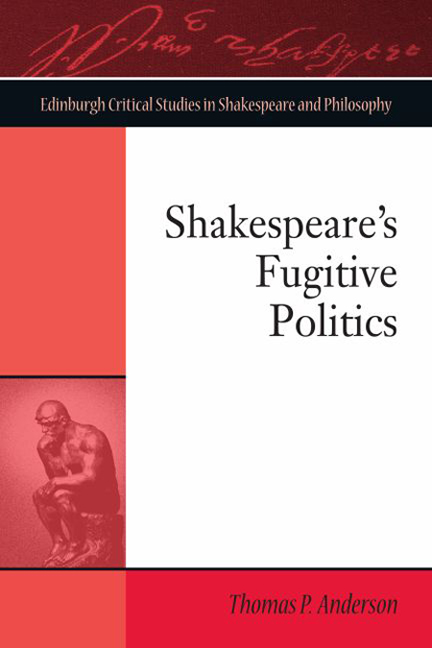Book contents
- Frontmatter
- Contents
- Acknowledgements
- Series Editor's Preface
- 1 The Embodied Will in Julius Caesar: An Introduction to Shakespeare's Fugitive Politics
- 2 Friendship, Sovereignty and Political Discord in Coriolanus
- 3 Touching Sovereignty in Henry V
- 4 Sovereignty's Scribbled Form in King John
- 5 Body Politics and the Non-Sovereign Exception in Titus Andronicus and The Winter's Tale
- Epilogue
- Notes
- Bibliography
- Index
Epilogue
Published online by Cambridge University Press: 29 July 2017
- Frontmatter
- Contents
- Acknowledgements
- Series Editor's Preface
- 1 The Embodied Will in Julius Caesar: An Introduction to Shakespeare's Fugitive Politics
- 2 Friendship, Sovereignty and Political Discord in Coriolanus
- 3 Touching Sovereignty in Henry V
- 4 Sovereignty's Scribbled Form in King John
- 5 Body Politics and the Non-Sovereign Exception in Titus Andronicus and The Winter's Tale
- Epilogue
- Notes
- Bibliography
- Index
Summary
In Shakespeare's Fugitive Politics, I have argued that the political in Shakespeare is more important than politics. In making this case with readings of plays that span the trajectory of Shakespeare's dramatic career, I hope to have demonstrated that his plays were incubators for a political philosophy that considered the expression of politics to be evanescent rather than formal, fugitive rather than sustained, and antagonistic rather than consensual. Each of the book's chapters has demonstrated that Shakespeare imagined sovereign power as a productive force for political contestation and that the consequence of the sovereign exception was a divided absolutism – the breach that reallocates sovereign power to enable alternative political communities.
The political in the plays examined in Shakespeare's Fugitive Politics coalesces into an archive of dramatic characters and theatrical action. Characters discover themselves to be the subject of time and history, or, in the Bastard's own language from King John, find themselves ‘bastard[s] to the time’ (1.1.207) – a process of exposure to the political as it is remembered and recreated on the stage in Shakespeare's London. Mark Wenman describes this type of exposure as ‘a certain precedence of human freedom’ and an indication of the ‘priority of constituent power’, even in the face of sovereign power that renders life bare. Each chapter discovers fugitive politics in Shakespeare through close readings of plays that expose the imbricated relationship between fractured sovereignty and forms of non-sovereign agency central to creating new forms of political life – a funeral effigy in Julius Caesar, friendship in Coriolanus, bureaucratic sovereignty in King John, touch in Henry V, and volatile bodies in Titus Andronicus and The Winter's Tale. This productive dissensus between sovereign power and non-sovereign agency forges new ways of being in the early modern world responsive to a democratic calculus augmenting power beyond the bare life and the sovereign exception. Echoing Hannah Arendt and Thomas Paine on political action, fugitive politics enables subjects to become political actors and to possess the power to reimagine the world and begin it anew. This is what we see in the closing scene of The Winter's Tale with Hermione's resurrection, and this is what we see in Henry V with Catherine's sugar touch.
- Type
- Chapter
- Information
- Shakespeare's Fugitive Politics , pp. 193 - 200Publisher: Edinburgh University PressPrint publication year: 2016

